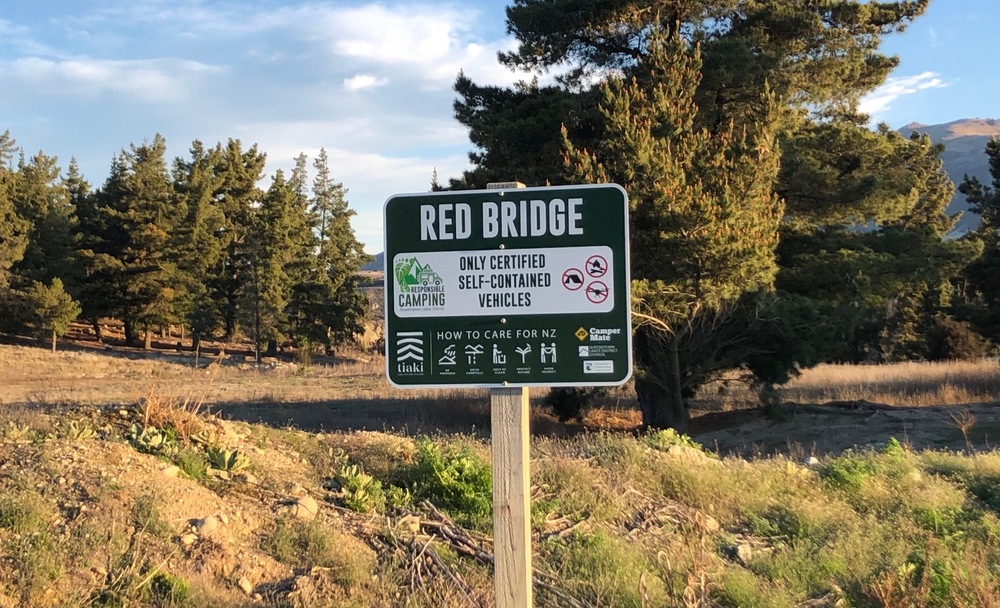Luggate campground, community cricket may fold
Diana Cocks
23 September 2020, 6:04 PM
 Free camping at the Red Bridge reserve is for self-contained vehicles only.
Free camping at the Red Bridge reserve is for self-contained vehicles only.The Luggate Albion Cricket Club (LACC) will cease to exist in 18 months if freedom camping is permitted to continue at the Red Bridge reserve, the club’s president is predicting.
LACC president Mike O'Connor said the unmonitored free camping permitted and promoted by the Queenstown Lakes District Council (QLDC) on the former gravel pit at the reserve is driving the Luggate campground into the ground.
Proceeds from the campground are put back into community cricket. Over the past 10 years, Mike said, the LACC has spent over $250,000 on sports equipment, ground fees, the construction of two new wickets in Hāwea and Wanaka, and coaching costs which help to keep the fees down for children wanting to play cricket. In 2006 there were four cricket teams in the district; now there are 16.
In addition to this, the club also spent around $100,000 (excluding the volunteered labour) to upgrade the ablutions at the campground at the direction of the QLDC, he said.
The Luggate campground, which is located in the centre of Luggate within a three minute drive from the free camping area, used to average 15 visitors per night during its eight month season (excluding the winter hiatus), Mike said.
Since the free camping area was opened at the Red Bridge three years ago and advertised on Campermate the club has experienced a decrease in overnight stays of between 60 to 75 per cent.
“This is do or die for us,” Mike said. “Our club as it stands today will fold if the gravel pit remains or the QLDC don't police the pit properly.”
With central government funding, the council arranged camping ambassadors over the last three summers to monitor the free camping area, to ensure vehicles didn’t stay more than two consecutive nights and to advise those which were not self-contained where they could legally stay at registered campgrounds.

The council uplifted the prohibition on camping at the Red Bridge reserve in December last year after it was realised the free camping area designated by council was illegal.
“We didn’t receive a single person referred by the ambassadors,” Mike said.
On September 17 this year he said there were 22 cars parked at the Red Bridge free camping site; five non-certified.
Mike contacted the QLDC to ask why non-certified vehicles were permitted to stay at the free camping area and was told by QLDC staff "we don't have the funding or the resources to manage or control who stays at the Red Bridge”.
“If they [the QLDC] can’t look after what they’ve created then it should be closed,” he said.
Deputy mayor Calum Macleod said he supports the LACC’s operation of the Luggate campground and its benefits to community cricket but the gates at the Red Bridge reserve couldn’t be closed to free camping.
The historic site is being maintained and developed by the Luggate Community Association and the public has a right to access the reserve and public toilets. It’s also used by people carpooling, Calum said.
QLDC councillor Quentin Smith added that closing the free camping area would not guarantee these campers would go to a commercial campground instead.
Even though commercial campgrounds at Albert Town and Hawea had also reported a downturn in visitor numbers since the free camp site was opened, Quentin said the council had “good information” that freedom campers using the gravel pit site was “not at the expense of paid sites”.
“They use a site because it's free and moving them on wouldn’t necessarily mean they choose a paid site.” he said.
“While I sympathise with the Luggate Cricket club I am not sure what council can do to drive paying customers to their site.”
Mike said it would help “if the council enforced its own rules and what was promised about self-contained vehicles”.
“This isn’t people sleeping rough because they’ve got nowhere else to go; this is people having a holiday at our expense.”
The Freedom Camping Act 2011, which states councils cannot totally prohibit freedom camping, remains the biggest barrier to managing freedom camping effectively in our district, Quentin said.
PHOTOS: Wanaka App






